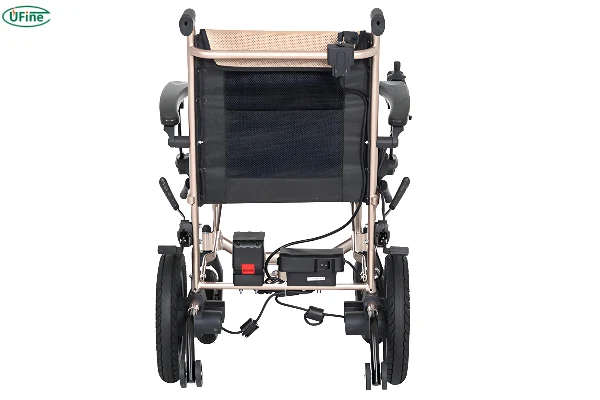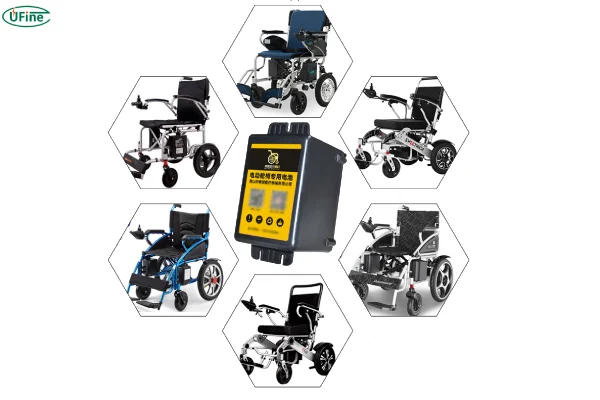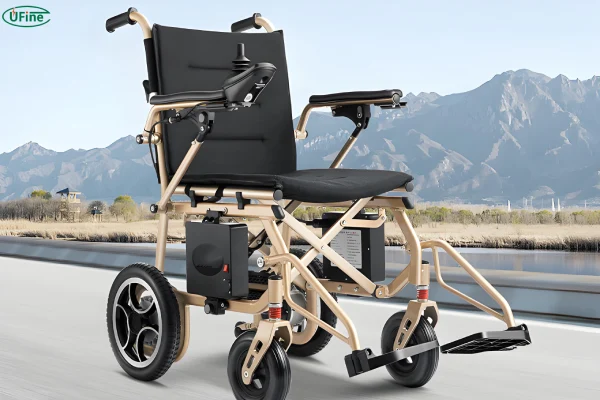
- Part 1. What types of batteries are used in electric wheelchairs?
- Part 2. Key parameters
- Part 3. How many batteries does an electric wheelchair have?
- Part 4. How long do electric wheelchair batteries last?
- Part 5. Electric wheelchair battery chargers
- Part 6. How to choose the right electric wheelchair batteries?
- Part 7. Electric wheelchair battery manufacturers: Ufine Battery
- Part 8. Conclusion
This transformative technology lies a vital component: the battery. Electric wheelchair batteries are the power source that fuels these life-changing devices, enabling users to navigate their world with ease and confidence.
This in-depth guide delves into the intricate world of electric wheelchair batteries, providing a comprehensive understanding of their types, parameters, and lifespan. We’ll explore the key considerations for choosing the right batteries, the importance of proper charging, and the role of reputable manufacturers like Ufine Battery. By gaining a deeper understanding of these essential components, users can maximize their wheelchair’s performance, extend its lifespan, and ensure a smooth and reliable mobility experience.
Part 1. What types of batteries are used in electric wheelchairs?
Electric wheelchairs typically utilize two primary types of batteries, each with its own unique characteristics and advantages:
1. Lead-Acid Batteries:
-
The Traditional Choice: Lead-acid batteries have been the mainstay of electric wheelchair power for decades due to their affordability and widespread availability. They are often the most budget-friendly option and can be readily found at most automotive stores.
-
Pros: Relatively low cost, readily available, and well-established technology.
-
Cons: Heavier than other options, shorter lifespan, require regular maintenance (topping off with distilled water), and can be prone to sulfation (a buildup of lead sulfate on the plates, reducing capacity).
-
The Future of Mobility: Lithium-ion batteries have gained immense popularity in recent years due to their superior performance and longevity. They are lighter, more compact, and offer a longer lifespan than lead-acid batteries.
-
Pros: Lighter weight, higher energy density (meaning more power in a smaller package), longer lifespan, lower maintenance requirements, and faster charging times.
-
Cons: Higher initial cost compared to lead-acid batteries, more sensitive to extreme temperatures, and potential for fire hazards if not handled properly.
Part 2. Key parameters
To make informed decisions about electric wheelchair batteries, it’s crucial to understand several key parameters that determine their performance and suitability:
-
Voltage: The voltage of a battery determines its power output. Electric wheelchair batteries typically operate at 12 volts or 24 volts. Higher voltage generally translates to greater power and speed.
-
Capacity: The capacity of a battery is measured in amp-hours (Ah). A higher capacity means the battery can store more energy and provide a longer range before needing a recharge. For example, a 50 Ah battery will provide twice the range of a 25 Ah battery at the same voltage.
-
Discharge Rate: The discharge rate indicates how quickly the battery can deliver its stored energy. A higher discharge rate is essential for providing sufficient power for demanding tasks, such as navigating inclines or rough terrain. Batteries with higher discharge rates are often referred to as “high-C” batteries.
-
Lifespan: The lifespan of a battery is measured in charge cycles. A charge cycle is one complete discharge and recharge of the battery. Lithium-ion batteries generally have a longer lifespan than lead-acid batteries, typically lasting for several hundred to thousands of charge cycles before experiencing significant degradation.
-
Self-Discharge Rate: All batteries lose charge over time, even when not in use. This is known as self-discharge. Lithium-ion batteries have a lower self-discharge rate than lead-acid batteries, meaning they retain their charge for longer periods when not in use.
Part 3. How many batteries does an electric wheelchair have?
The number of batteries in an electric wheelchair depends on the model and its power requirements. Most electric wheelchairs utilize either two or four batteries. The specific number of batteries is determined by the voltage and capacity needed to provide the desired range and performance.
-
Two Battery Systems: Often found in lighter-duty wheelchairs, these systems typically use 12-volt batteries, providing a total voltage of 24 volts.
-
Four Battery Systems: Common in heavier-duty wheelchairs or those designed for longer ranges, these systems typically utilize four 12-volt batteries, providing a total voltage of 48 volts.
Part 4. How long do electric wheelchair batteries last?
The lifespan of electric wheelchair batteries can vary significantly depending on several factors:
-
Battery Type: Lithium-ion batteries generally have a longer lifespan than lead-acid batteries.
-
Usage Patterns: Frequent use and deep discharges can shorten the lifespan of any battery. Conversely, infrequent use and shallow discharges can extend lifespan.
-
Charging Practices: Proper charging practices are essential for maximizing battery lifespan. Always use the correct charger for your battery type and avoid overcharging or deep discharging.
-
Environmental Conditions: Extreme temperatures can significantly impact battery performance and lifespan. Storing batteries in a cool, dry environment can help extend their lifespan.
-
Maintenance: Regular maintenance, such as cleaning battery terminals and checking for corrosion, can help prevent premature battery failure.
Part 5. Electric wheelchair battery chargers
Electric wheelchair batteries require specialized chargers to ensure safe and efficient charging. These chargers are typically designed to match the specific voltage and capacity of the batteries. Here are some key features to look for in an electric wheelchair battery charger:
-
Automatic Charging Termination: A good charger will automatically terminate charging once the battery is fully charged, preventing overcharging and damage.
-
Temperature Monitoring: Some chargers include temperature monitoring to protect the battery from overheating during charging.
-
Charging Time: The charging time for electric wheelchair batteries can vary depending on the battery type, capacity, and charger. Lithium-ion batteries generally have faster charging times than lead-acid batteries.
Part 6. How to choose the right electric wheelchair batteries?
Selecting the right batteries for your electric wheelchair is essential for maximizing its performance, extending its lifespan, and ensuring a smooth and reliable mobility experience. Here’s a comprehensive guide to help you make an informed decision:
-
Battery Type: Consider your needs and budget. Lithium-ion batteries offer superior performance and longevity but may be more expensive. Lead-acid batteries are more affordable but have a shorter lifespan.
-
Voltage and Capacity: Choose batteries with a voltage and capacity that meet the requirements of your electric wheelchair. Higher voltage and capacity generally provide a longer range and more power.
-
Discharge Rate: Consider the discharge rate if you need to perform demanding tasks, such as navigating inclines or rough terrain. A higher discharge rate will provide more power for these situations.
-
Lifespan: Lithium-ion batteries typically have a longer lifespan than lead-acid batteries. Consider the lifespan of the batteries when making your decision.
-
Manufacturer Reputation: Choose batteries from reputable manufacturers that offer warranties and reliable customer support.
-
Compatibility: Ensure the batteries are compatible with your electric wheelchair model. Check the manufacturer’s specifications or consult with a qualified technician.
-
Weight and Size: Consider the weight and size of the batteries, especially if you need to lift or transport them frequently.
-
Cost: Compare prices from different manufacturers and consider the total cost of ownership, including the initial purchase price, replacement costs, and maintenance expenses.
Part 7. Electric wheelchair battery manufacturers: Ufine Battery
Ufine Battery is a leading Chinese manufacturer of lithium batteries, specializing in custom solutions for various applications, including electric wheelchairs. They offer a wide range of lithium-ion batteries, lithium polymer batteries, 18650 batteries, LiFePO4 batteries, high-temperature batteries, low-temperature batteries, and more. Ufine Battery excels in customizing batteries to meet specific requirements for size, capacity, and voltage, making them a reliable choice for electric wheelchair manufacturers and users. Their commitment to quality, innovation, and customer satisfaction has earned them a reputation as a trusted partner in the mobility industry.
Part 8. Conclusion
Electric wheelchair batteries are the heart of mobility, providing the power that enables users to navigate their world with freedom and independence. By understanding the types, parameters, and lifespan of batteries, choosing the right charger, and selecting reputable manufacturers like Ufine Battery, you can ensure your electric wheelchair operates at peak performance, extending its lifespan and enhancing your mobility experience. With the right knowledge and informed choices, you can unlock the full potential of your electric wheelchair and embrace the power of mobility.
Related Tags:
More Articles

Battery Load Test: A Comprehensive Guide
Step-by-step battery load test guide for car, solar & industrial use. Learn how to load test a battery, interpret voltage charts, and avoid common mistakes.
The Comprehensive Guide to Battery Balancing and Battery Balancer
Discover how battery balancers improve lithium battery performance, lifespan, and safety. Learn types, functions, and tips to choose the right balancer.
What Is the Best Voltage for a Chainsaw Battery?
Compare 12V-80V chainsaw batteries for light pruning, medium firewood, and professional cutting. See best battery chainsaw with runtime charts and safety tips.
Lithium VS. Alkaline Batteries: A Comprehensive Comparison
Lithium batteries last 3–7× longer than alkaline and perform better in cold weather. Compare lifespan, cost, safety, and best uses to choose the right battery.
Comparing Lithium-Sulfur and Lithium-Ion Batteries: Which is Right for You?
Compare lithium-sulfur (Li-S) and lithium-ion batteries on energy, lifespan, cost, safety, and applications. Best choice for drones, EVs, and electronics.





